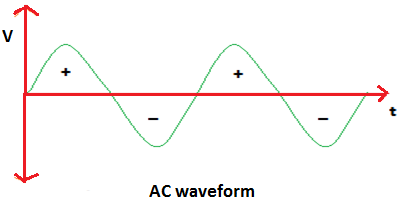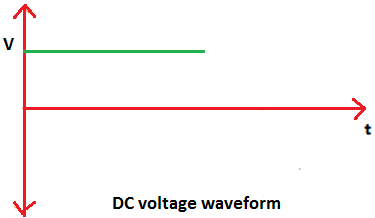
How does AC differ from DC? What are the advantages and disadvantages of AC over DC?
Answer
580.2k+ views
Hint: AC and DC refer to alternating current and direct current respectively. The AC is sinusoidal, that's why its sign changes in every half cycle. DC remains in one domain only. One of the advantages of ac current is that it can be used to recharge the rechargeable battery but one big disadvantage is that its shock is attractive which can even cause death.
Complete answer:
Alternating current: alternating current is an electric current that changes its direction and magnitude in every half cycle. These are used to transmit energy through distance.
The following figure shows the waveform of the AC.

Direct current: direct current is a type of electric current which is unidirectional. Due to this all charge carries always flow in one direction only. DC current can be obtained through AC current using half wave and full wave rectifier circuits.
The following diagram represents the waveform of DC.

Advantages of AC:
> AC is easy to modify and can be transmitted to distinct places. Thus, they are used in electrical transmission power lines. This efficient transmission powerline helps companies and the consumer to save a lot of money.
> High-speed AC motors require very low maintenance and they can be used in many industries.
>It is easy to interrupt the current or break the flow of current as it changes its direction in every half cycle. For example, a circuit breaker can interrupt AC much easily over DC.
Disadvantages of AC over DC:
>The shock of the AC is attractive but the shock of dc is repulsive. A person can even die due to high electric shock.
> At high voltages, it is risky to work with AC.
> In the processes like electro-refining, electroplating, etc. One cannot use the AC. In these processes, only DC can be used.
Note:
AC current changes its direction in every half cycle but DC current is a unidirectional type of current. The effective current and voltage value of AC current are found by finding their RMS values. The RMS value of the AC current is equivalent to the value of DC current.
Complete answer:
Alternating current: alternating current is an electric current that changes its direction and magnitude in every half cycle. These are used to transmit energy through distance.
The following figure shows the waveform of the AC.

Direct current: direct current is a type of electric current which is unidirectional. Due to this all charge carries always flow in one direction only. DC current can be obtained through AC current using half wave and full wave rectifier circuits.
The following diagram represents the waveform of DC.

Advantages of AC:
> AC is easy to modify and can be transmitted to distinct places. Thus, they are used in electrical transmission power lines. This efficient transmission powerline helps companies and the consumer to save a lot of money.
> High-speed AC motors require very low maintenance and they can be used in many industries.
>It is easy to interrupt the current or break the flow of current as it changes its direction in every half cycle. For example, a circuit breaker can interrupt AC much easily over DC.
Disadvantages of AC over DC:
>The shock of the AC is attractive but the shock of dc is repulsive. A person can even die due to high electric shock.
> At high voltages, it is risky to work with AC.
> In the processes like electro-refining, electroplating, etc. One cannot use the AC. In these processes, only DC can be used.
Note:
AC current changes its direction in every half cycle but DC current is a unidirectional type of current. The effective current and voltage value of AC current are found by finding their RMS values. The RMS value of the AC current is equivalent to the value of DC current.
Recently Updated Pages
Master Class 10 Computer Science: Engaging Questions & Answers for Success

Master Class 10 General Knowledge: Engaging Questions & Answers for Success

Master Class 10 English: Engaging Questions & Answers for Success

Master Class 10 Social Science: Engaging Questions & Answers for Success

Master Class 10 Maths: Engaging Questions & Answers for Success

Master Class 10 Science: Engaging Questions & Answers for Success

Trending doubts
What is the median of the first 10 natural numbers class 10 maths CBSE

Which women's tennis player has 24 Grand Slam singles titles?

Who is the Brand Ambassador of Incredible India?

Why is there a time difference of about 5 hours between class 10 social science CBSE

Write a letter to the principal requesting him to grant class 10 english CBSE

A moving boat is observed from the top of a 150 m high class 10 maths CBSE




